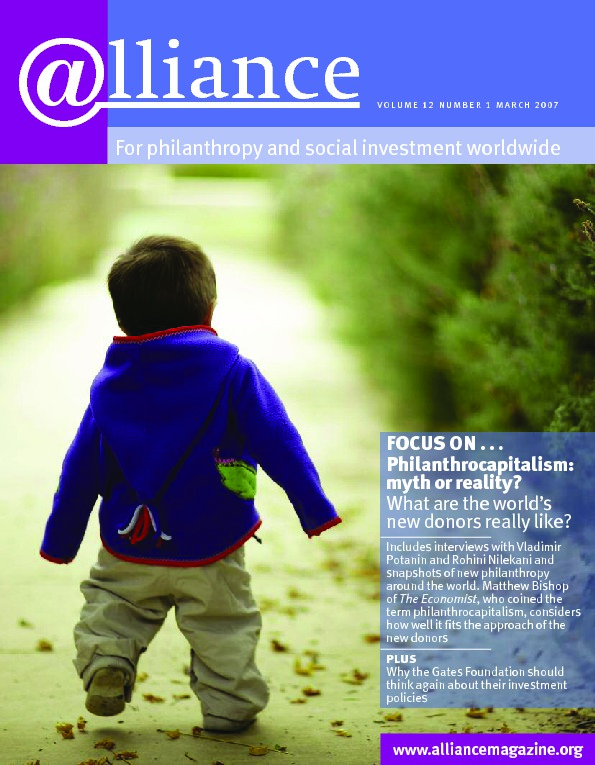NGOs can play an important role in meeting basic needs; they can also empower people to play an active role in the democratic process, thereby underpinning and fortifying that process. Yet in many countries the non-profit sector has a far from easy ride from the state. Traditional concern about opposition has in recent years been augmented by a newly discovered interest in accountability and fears about foreign influence and NGO vulnerability to terrorist financing. Over the last two years, the UK Charity Commission’s International Programme has been sharing ideas about effective regulation with government officials and NGOs in a number of countries across Africa, the Middle East, South Asia and South-East Asia. Their aim is to maximize the contribution that NGOs can make in their country by encouraging some creative thinking about how to enable the entire sector to work in the best possible way.
We promote proportionate regulation of NGOs – not just because the non-profit sector potentially has a significant economic and social value to a country but because it’s cost-effective for governments. We believe that achieving the right balance in regulation can ensure that NGOs are not involved in criminal or inappropriate activity without hampering legitimate work.
The four key elements
The NGO sector seems to flourish in a country where four conditions apply: there is good NGO legislation, effective regulation, sector capacity/capacity development, and partnership between the government and the sector.
Effective action by NGOs is partly dependent upon the amount of political discretion and bureaucracy that they face from their (government) regulator. Good NGO legislation is important here, but it is not the whole solution, since the effect of legislation depends on its implementation.
Effective regulation improves the ‘operating space’ for NGOs in a country irrespective of the state of NGO legislation. It also helps to raise standards within the sector and leads to more publicly available information on NGOs, increasing the range of possible local partners and raising donor confidence. In recent years, the International Centre for Not-for-Profit Law and others have done a lot of work in Central Asia and Eastern Europe on law reform and NGO policy development, but much still remains to be done in other regions, and in steering how such laws and policies are put into practice.
There is huge need for capacity-building in many countries. This might involve supporting the development of more NGOs and helping to enhance the performance of existing ones. Encouraging better networking within the sector, the creation of umbrella bodies, and the spread of good practice are important for ensuring that capacity-building is driven forward and locally owned. While an enormous amount of support has been given to individual NGOs worldwide in recent years, efforts to mobilize the latent power of the whole sector in a country appear to have been limited.
Finally, genuine partnership between government and the sector underpins the other three key elements. Where there are channels of communication between government and the sector, NGOs have opportunities to influence policy development and there is potential for governments and NGOs to cooperate to achieve mutual goals. As it is, fear of foreign influence and terrorist manipulation have added to the suspicion with which the sector is often viewed by governments. As Filiz Bikmen highlights in the September 2006 issue of Alliance (p28), a strong case for civil society’s significance is not enough to bring about positive change in law and government policies concerning NGOs in a country.
The work of the International Programme
We need to think about different models to address the concerns which cause governments to introduce restrictive legal provisions for the NGO sector and we believe that there is much to be gained through the international exchange of ideas as some countries have developed workable solutions. Clearly, the driving forces in any change process need to be the local governments and NGOs, but we find that an incomplete debate often takes place between them. The reasons for this usually include a lack of information on other models, of specific technical knowledge, and of neutral mediation/facilitation. We are working in partnership with governments and NGOs to try and overcome these challenges.
We introduce ideas of effective regulation in a country through training workshops for senior regulatory personnel and meetings with NGOs. Assessing current NGO legislation and regulatory practice, we identify areas for improvement and may offer consultancy on aspects of regulation, capacity development and providing an enabling environment for NGOs while maintaining effective oversight. We may also facilitate consultation meetings between the government and the sector. We find that the Charity Commission’s neutral status gives us credibility with both the government and NGOs in a country. In some situations, the fear of internal opposition or external interference can drown out a rational debate; here, diplomatic pressure is needed in addition.
Significant reform in laws and policies concerning NGOs will take time, but positive developments are evident in a number of countries, including Pakistan. It’s important to learn from these examples and help good practices spread regionally and internationally.
Spotlight on Pakistan
Pakistan has experienced a huge growth in NGO activity in recent years. Funds from community contributions, local donors and government are a significant percentage of the country’s GDP and have helped create a well-developed NGO sector. However, a lot of work still needs to be done to support the sector to grow and thrive. Workshops organized by the Humanitarian Forum[1] in a number of countries in 2005-06 identified a general issue that NGOs in Muslim countries may not be reaching their full potential. A poor working environment for NGOs, due to restrictive or unclear regulations and a lack of trust between government and NGOs, was recognized as one of the main causes of the problem.
The workshops shed light on further specific problems facing the sector in different countries. Particular issues identified in Pakistan included the lack of specialized training for NGO workers and the fact that donations from local communities have reduced because of increased suspicion of Muslim-run NGOs since 9/11. Decreased commitment and dedication from both volunteers and staff was another concern.
However, there are positive developments under way. The government is working closely with NGOs throughout the country to agree a new framework for their relationship. With the assistance of the Charity Commission’s International Programme, a Code of Conduct is being developed to set out both how the government will support, advise and regulate NGOs and how NGOs will be accountable for their activities. This will be followed by training of staff in government offices to be more effective in supporting NGOs and regulating them appropriately. Plans for new legislation in the spirit of the Code are in the pipeline and might be introduced to parliament in 2008.
The Government is also developing a publicly accessible database of NGOs (www.ngosinfo.gov.pk/) that will allow users to see what NGOs exist, where they are operating, and how they are spending their money. This will be a useful resource for information on potential partners. The processes for developing the Code of Conduct and marketing the database are helping to open up dialogue between the government and the NGO sector, an important first step towards greater cooperation on policy development.
Finally, the government is supporting capacity-building initiatives to raise standards across the NGO sector, promoting public and donor trust and confidence in NGOs, and supporting skills development. The Pakistan Centre for Philanthropy has done some important work in this field, but the government is keen to extend opportunities to thousands more NGOs.
This is only a beginning. There are significant challenges ahead with regard to shaping the relationship between the government and the sector in Pakistan, agreeing and implementing the Code of Conduct, bringing all NGOs on board, and encouraging them to raise their standards. However, with the right kind of assistance, there is great hope for an increasingly dynamic sector.
1 The Humanitarian Forum explores possible ways of integrating Muslim NGOs into the international field of humanitarian relief and development cooperation.
For more information
Pakistan National Database of NGOs http://www.ngosinfo.gov.pk
Pakistan Centre for Philanthropy http://www.pcp.org.pk
Humanitarian Forum website under development
James Shaw-Hamilton is Head of the Charity Commission’s International Programme. Email James.Shaw-Hamilton@charitycommission.gsi.gov.uk



Comments (0)